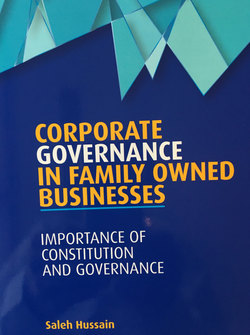Читать книгу Corporate Governance in Family Owned Businesses - Saleh Hussain - Страница 3
На сайте Литреса книга снята с продажи.
Author’s Note
ОглавлениеMy journey with Corporate Governance started in 1998, when asked by my son Esam, who was then studying in United Kingdom for his MBA, to help with providing reference materials on the subject. Reacting to that request, and in fact reacting to the new terminology of Corporate Governance (“CG”), prompted a desire to investigate the meaning and application of CG. I read then good number of research papers on the subject. In 1999 and 2000 I attended an annual conference called International Corporate Governance Conference at Henley Management College, currently known as “Henley Business School”. I continued to attend the conference on annual basis until 2002/3.
During the years I attended those conferences I met Prof Chris Mallin, who has active interest in the subject. We discussed the issue at length and agreed to undertake a field study on “Corporate Governance in the listed Companies in Bahrain. I did the field- work, collected the data and information and sent to Prof. Mallin for analysis. The paper was published in 2002 under the joint names of Prof. Chris Mallin, University of Birmingham and Saleh Hussain. Corporate Governance: An International Review, Vol. 10, pp. 197-210, 2002
We then worked jointly on another paper “Dynamics of Corporate Governance in Bahrain”. We published the paper in 2003 in the “Journal of Corporate Governance. Corporate Governance: An International Review: Volume 11, Issue 3, pages 249–261, July 2003.
Since 2002 until 2015, I continued the journey into Corporate Governance. As of the time of writing this book, I have authored around twelve books on the subject in Arabic and English languages.
Furthermore, in complete departure from my position as General Manager of a bank, I decided in 2007 to establish my own consultancy firm specializing in provision of corporate governance services which include: writing new CG manuals for clients, assisting with implementation and conducting training sessions to Board Members and members of executive management.
Bahrain is the first among Gulf Cooperation Countries (“GCC”) to issue a comprehensive Corporate Governance Code. The Bahrain CG code was issued in March 2010 by Ministry of Industry and Commerce (“MOIC”) and Central Bank of Bahrain (“CBB”).
The code made it mandatory to comply for all financial institutions & Banks and listed companies operating in the Kingdom of Bahrain effective January 2011.
In drafting the code, Bahrain formed a national committee with members from public and private sectors. I was given the honor and opportunity to be a member in that committee.
The regulators in this part of the world, Middle East and GCC in particular, have been working on introducing CG guidelines for the past few years. They continue to upgrade those guidelines as we speak. The target applicants of the so far issued regulations are the listed companies and financial sector in the region. Both listed companies and financial sector represent between 15% and 20% of total GDP in the Middle East and GCC. The remaining major portion of the economy approximately 80% remains outside the domain of requirements and mandatory application of CG requirements. This 80% represents government and family owned businesses.
I have included in some of my previous books a chapter or two on CG in Family Owned Businesses and Government Owned Companies. But I thought that was not enough.
Hence, I thought of writing more about family owned businesses “FOBs” and this book is on the very subject. The importance of family owned businesses to the economy of the world cannot be over emphasized. The contents of the book will provide the respected reader with a lot of information, facts and statistics about FOBs worldwide, in the Middle East and in GCC.
The FOBs represent major contribution to any country not only through the businesses they own and control but also through their various ownerships outside their direct businesses through shareholding in other businesses in any economy internally and externally.
As FOBs develop and expand, the need arise for them to address many organizational and governance issues. If they chose to voluntarily address these issues, they are the winners but if they wait then they might be subjecting their business to difficulties or asked by regulators to comply with CG and other regulations while they might not fully prepared.
They have the choice for now but not for long.
Saleh Hussain
August 2016
